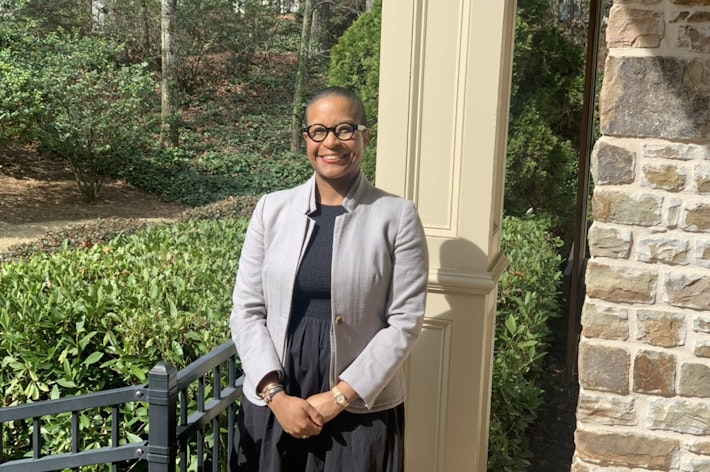An Afternoon with Jennifer Finney Boylan
Author and transgender rights activist Jennifer Finney Boylan brought her message of empathy and understanding to the Radcliffe Institute.
She was funny, insightful, and inspiring. The Knafel Center was full on that February afternoon when Jennifer Finney Boylan—born James Boylan—brought her message of empathy and understanding to the Radcliffe Institute at an event sponsored by the Schlesinger Library. “The cause—the root cause—of so much trouble,” Boylan said, “stems from our lack of interest in imagining what the experience of being human is like for people who are not us.”
The author of 15 books, including She’s Not There: A Life in Two Genders (Broadway Books, 2003), the first best-selling work by a transgender American, Boylan is the inaugural Anna Quindlen Writer in Residence at Barnard College of Columbia University. She is also the chair of the board of GLAAD (Gay & Lesbian Alliance Against Defamation) and a New York Times contributing op-ed writer.
Discussing a timely topic—which bathrooms transgender people should use—Boylan said, “My sense is that the current imbroglio in North Carolina and elsewhere is not really about bathrooms at all. It’s about the fact that plenty of people just don’t like the idea that there are transgender people in the first place and cannot imagine our lives. They think that people who are trans—or different in any way—have somehow come up with the entirety of our existence primarily in order to hurt other people’s feelings.”
In one of the most moving moments of her presentation, Boylan demonstrated and led the audience in practicing the hand movements to sign “transgender.” In American Sign Language, “transgender” used to be the word “sex” signed backwards, but recently the sign has become a closed hand facing down and then opening up like a flower and held over the heart. Boylan emphasized that she has seen people open their hearts on a range of issues “when some otherized soul is revealed to be a member of their own family or a friend.”
At the conclusion of her remarks, Boylan engaged Harvard College students Schuyler Bailar ’19 and Jessica Fournier ’17 in conversation about their experiences on campus. Bailar explained that he was recruited to Harvard by the women’s swim team, where he found an accepting community, but he eventually decided to join the men’s team, which also welcomed him. He is the first openly transgender athlete to compete in the NCAA. Fournier, the first in her family to attend college, is an activist for LGBT issues and Our Harvard Can Do Better, a student organization advocating for the reform of policies regarding campus sexual violence. Responding to Boylan’s question about how queer and trans students have reacted to the results of the presidential election, Bailar and Fournier said students have been supportive of one another. “There’s been an upwelling of solidarity,” Bailar said.
Calling herself “the soccer mom of the movement,” Boylan stressed that the trans community is incredibly diverse. “If you’ve met one trans person, you’ve met one trans person, but that’s the strength of our community.”







